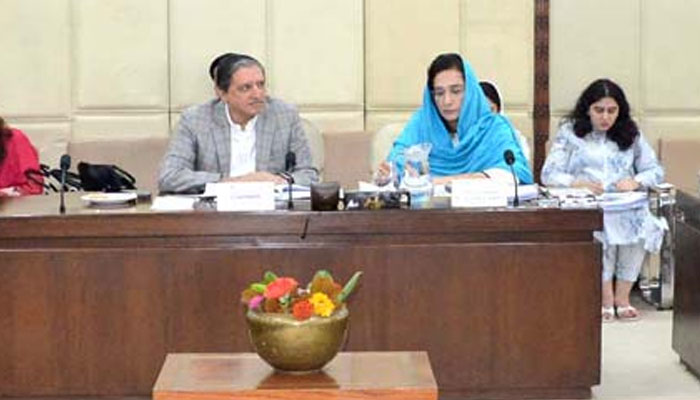Senate panel chief assails ‘higher’ profit rates charged by Islamic banks
Protection of depositors has increased up to Rs500,000 against earlier limit of Rs250,000
ISLAMABAD: The Senate Standing Committee on Finance Wednesday cleared two important bills to comply with the conditions of IMF programme.
The bills included the Banking Companies Amendment Bill, 2024 and Deposit Protection Corporation Amendment Bill, 2024 under which the protection of depositors has increased up to Rs500,000 against the earlier limit of Rs250,000. The committee met at the Parliament House with Senator Saleem Mandviwalla in the chair. It reviewed and passed the “Deposit Protection Corporation Amendment Bill, 2024.” Deputy Governor of the State Bank Dr. Inayat Hussain gave a detailed briefing on the bill.
Under the new amendment, depositors will receive legal protection for amounts up to Rs500,000, an increase from the previous limit of Rs250,000. Dr. Hussain noted that while the microfinance banks were not currently included in the bill, future amendments might extend protection to them as well. He also reported the IMF had advocated for enhanced depositor protection. Dr. Hussain revealed the board members of State Bank earn Rs75,000 per meeting, while other banks charge fees exceeding Rs50,000.
Senator Mohsin Aziz highlighted that such financial incentives contribute to the attraction of jobs in the banking sector. The committee also examined “The Banking Companies (Amendment) Bill, 2024,” which includes provisions for Islamic banking. Dr. Hussain emphasized that Islamic banking in Pakistan adhered to strict regulations compared to the global standards and noted that the IMF advocated for a unified regulatory framework for commercial and microfinance banks by December.
Senator Mandviwala raised concerns about the joint investment companies from foreign countries investing in government papers and urged the finance ministry to address this issue. Additionally, he advocated for a ban on such investments to prevent external influence on domestic markets.
The committee also discussed discrepancies in Islamic banking practices, with Chairman Mandviwala alleging that profit rates in Islamic banking could exceed those in conventional banking. He requested a detailed briefing on the Islamic banking practices from the State Bank. The meeting concluded with a call for greater transparency and regulatory oversight in Islamic banking.
-
 Why Kate Middleton, Prince William Opt For ‘show Stopping Style’
Why Kate Middleton, Prince William Opt For ‘show Stopping Style’ -
 Here's Why Leonardo DiCaprio Will Not Attend This Year's 'Actors Award' Despite Major Nomination
Here's Why Leonardo DiCaprio Will Not Attend This Year's 'Actors Award' Despite Major Nomination -
 Ethan Hawke Reflects On Hollywood Success As Fifth Oscar Nomination Arrives
Ethan Hawke Reflects On Hollywood Success As Fifth Oscar Nomination Arrives -
 Tom Cruise Feeling Down In The Dumps Post A Series Of Failed Romances: Report
Tom Cruise Feeling Down In The Dumps Post A Series Of Failed Romances: Report -
 'The Pitt' Producer Reveals Why He Was Nervous For The New Ep Of Season Two
'The Pitt' Producer Reveals Why He Was Nervous For The New Ep Of Season Two -
 Maggie Gyllenhaal Gets Honest About Being Jealous Of Jake Gyllenhaal
Maggie Gyllenhaal Gets Honest About Being Jealous Of Jake Gyllenhaal -
 'Bridgerton' Star Luke Thompson Gets Honest About Season Five
'Bridgerton' Star Luke Thompson Gets Honest About Season Five -
 Prince William On Verge Of Breakdown Because Of 'disgraced' Andrew
Prince William On Verge Of Breakdown Because Of 'disgraced' Andrew -
 Tig Notaro Reflects On Oscar Nod For 'Come See Me In The Good Light': 'I Was Sleeping'
Tig Notaro Reflects On Oscar Nod For 'Come See Me In The Good Light': 'I Was Sleeping' -
 Kenyon Sadiq Sets 40-yard Dash Record At NFL Scouting Combine, Eyes First Round
Kenyon Sadiq Sets 40-yard Dash Record At NFL Scouting Combine, Eyes First Round -
 Talk Show Host Drops Hint About Taylor Swift, Travis Kelce Wedding Date
Talk Show Host Drops Hint About Taylor Swift, Travis Kelce Wedding Date -
 Andrew Scandal Brings New Worries For Prince Harry, Meghan Markle
Andrew Scandal Brings New Worries For Prince Harry, Meghan Markle -
 King Charles Imposes New Restrictions On Ex-Prince Andrew In Surprise Move
King Charles Imposes New Restrictions On Ex-Prince Andrew In Surprise Move -
 Chris Hemsworth Reveals How Elsa Pataky Guides His Career Moves
Chris Hemsworth Reveals How Elsa Pataky Guides His Career Moves -
 Was Travis Barker In A Relationship With Kim Kardashian Before Marrying Her Sister?
Was Travis Barker In A Relationship With Kim Kardashian Before Marrying Her Sister? -
 Brad Pitt Feeling Down In The Dumps After Kids' Snubs As Pals Continue To Paint Angelina Jolie A Villain
Brad Pitt Feeling Down In The Dumps After Kids' Snubs As Pals Continue To Paint Angelina Jolie A Villain




